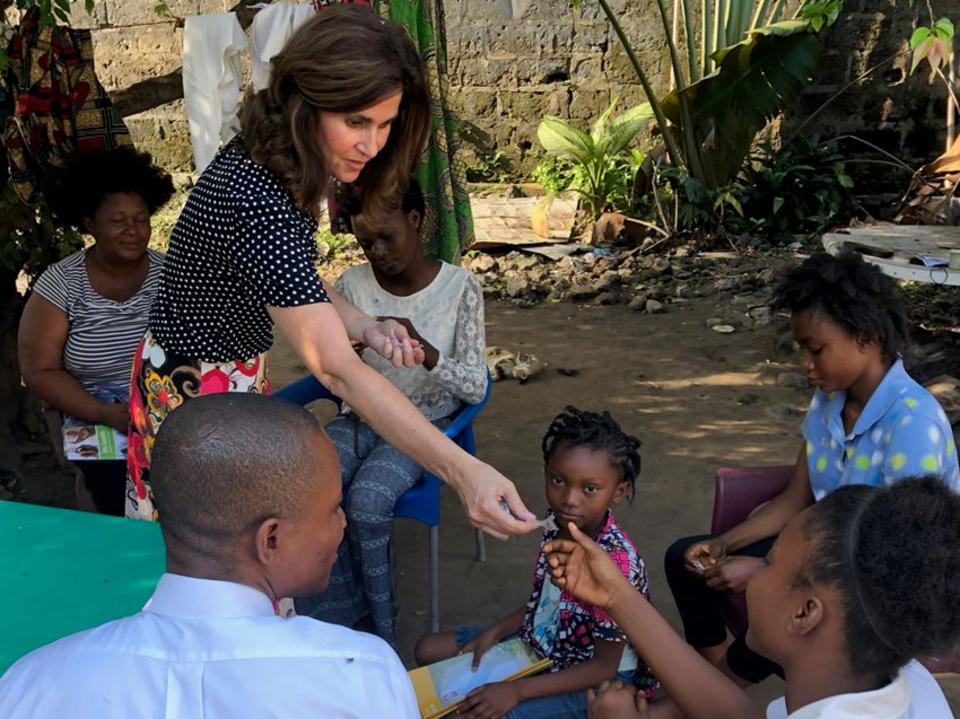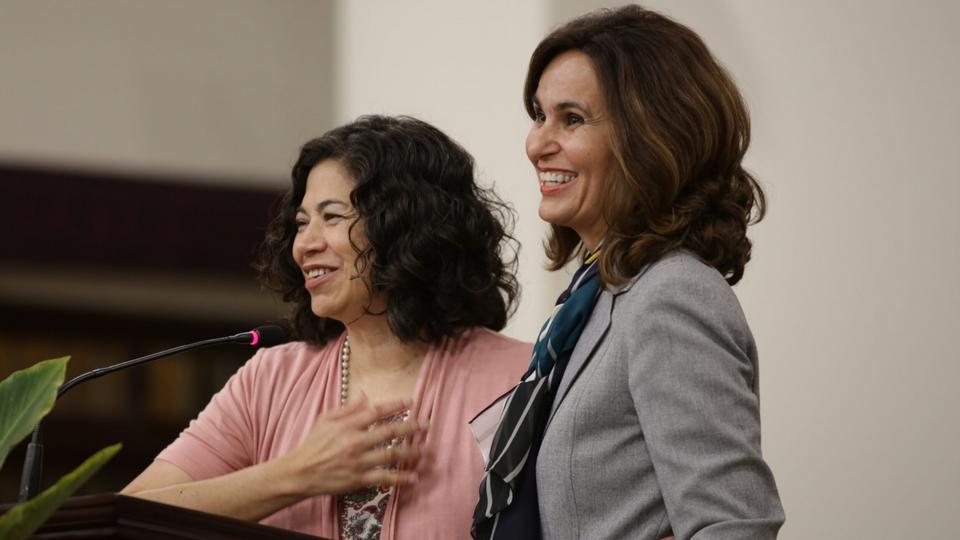| Sister Lisa L. Harkness visits with Latter-day Saints during a ministering visit in Kinshasa, Democratic Republic of the Congo, in May 2019. 2020 by Intellectual Reserve, Inc. All rights reserved. | 1 / 7 |
This story appears here courtesy of TheChurchNews.com. It is not for use by other media.
By Sister Lisa L. Harkness, first counselor in the Primary general presidency
Editor’s note: This narrative is part of a Church News series titled “Women of Covenant,” in which women of the Church discuss their personal experiences with priesthood power and share what they have learned through following President Russell M. Nelson’s counsel to “labor with the Spirit to understand God’s power — priesthood power” (“Spiritual Treasures,” general conference, October 2019). Read other articles in this series.
One Sunday, many years ago, as I headed out of the Church building to go home, I stopped to greet a woman I didn’t recognize. At the time, I had no idea I was about to have an experience that would continue to influence me to this day.
She was not a member of our faith and was visiting our services for the first time. We talked for a few minutes about her experience, and then I asked if she had any questions.
“Yes, I do,” she replied. “As a woman, do you feel bad that you don’t have the priesthood power?”
Her question was sincere, and I knew my answer mattered. What could I say to her that would help her understand?
It’s been 30 years now, and I can only remember a few details of my response. However, her question has lingered in my thoughts and I frequently look for opportunities to increase my own understanding of the doctrine of the priesthood. Each of us will need to seek this understanding for ourselves.
Studying the scriptures and words of modern prophets will provide a rich foundation for this knowledge to grow. So will obedience to God’s commandments and living true to the covenants we have made through priesthood ordinances. Understanding is given to us “line upon line, precept upon precept.” Through personal revelation, it “distills” upon our souls “as the dews from heaven” (D&C 121:45).

Women of Covenant-Harkness
Sister Lisa L. Harkness, first counselor in the Primary general presidency, visits with YSA in the South Hill Washington Stake on Aug. 16, 2019. Photo courtesy of Alisa Florence, South Hill Washington Stake, courtesy of Church News.This woman’s question came from her perspective of how the world views power, position and opportunity. But if we compare God’s power to the world’s model, we can make erroneous assumptions that might lead us to believe there are disparities in its distribution.
In the world, power is often an all or nothing possession. There is never enough of it to go around. It is often used to control others and is usually maintained only by force. Its misuse can lead to abuse and indulgent vices.
In contrast, God’s priesthood power is distributed very differently. It is given, bestowed, conferred and shared based on conditions of worthiness. It operates on principles of righteousness, which include “gentleness, meekness, and love unfeigned” (D&C 121:41).
The use of God’s power elevates and transforms our characters to become more like the giver, who is God. His power makes it possible for us to receive blessings we could never obtain on our own.
God said, “This is my work and my glory — to bring to pass the immortality and eternal life of man” (Moses 1:39). When He covenanted with Abraham, He promised that, through his posterity, all the families of the earth would be blessed with the “blessings of the Gospel, which are the blessings of salvation, even life eternal” (Abraham 2:11). As we enter into any sacred covenant, from baptism to sealing covenants in temples, we do so by God’s priesthood authority, which allows our covenants to be binding on earth and in heaven.
When we faithfully keep these priesthood covenants, God bestows upon us His promised power and blessings, including the highest blessings of salvation and exaltation.
President Russell M. Nelson taught, “Those who are endowed in the house of the Lord receive a gift of God’s priesthood power, along with a gift of knowledge to know how to draw upon that power” (“Spiritual Treasures,” October 2019 general conference).
The word endowment refers to a gift that is given to bless those in need. Certainly we all have needs as children of God that we are powerless to meet. For example, only God’s power can give us the “unspeakable gift of the Holy Ghost” (D&C 121:26). Only God’s power can offer forgiveness of all sin. Only God’s power offers the promise of eternal life in His presence. God’s powerful blessings meet our dearest needs.

Women Leaders in Guatemala
Sister Lisa L. Harkness, first counselor in the Primary general presidency, hugs a girl who is living in temporary housing in Escuintla, Guatemala, Wednesday, August 29, 2018.Our understanding of God’s priesthood power can be expanded as we ponder the blessings we have received from each covenant we have made with God, what we have been empowered to do because of those covenants, and how we can share those covenant blessings with others.
As we consider how the blessings we receive from keeping our covenants meet our dearest needs, we can better understand God’s divine power and its exalting purpose.
Sometimes I wonder how I would respond to my new friend’s question today.
Most likely, I would tell her that priesthood power refers to God’s power and authority and also the powerful blessings our Heavenly Father wants all of His children to receive and enjoy. As women and men, we allow these blessings to flow into our lives when we enter into — and keep — sacred covenants with God: covenants that are performed by one who has God’s priesthood authority.
And then I would probably ask, “Would you like to learn more?”








